
Megacorma obliqua, the black-belted hawkmoth, is a moth of the family Sphingidae.

Cechenena helops is a moth of the family Sphingidae first described by Francis Walker in 1856. It is found in Malaysia, Indonesia, the Philippines, Nepal, north-eastern India, Thailand, south-western China and Vietnam.

Theretra latreillii, the pale brown hawk moth, is a moth of the family Sphingidae described by William Sharp Macleay in 1826. It is found in most of Asia, including Borneo, China, Hong Kong, the Philippines, Taiwan and also throughout the tropical and temperate regions of Australia.

Theretra silhetensis, the brown-banded hunter hawkmoth, is a moth of the family Sphingidae described by Francis Walker in 1856. It lives in Indo-Australia, India, Sri Lanka, Papua New Guinea, East Australia, Solomon Islands, Fiji Islands, Vanuatu Islands.
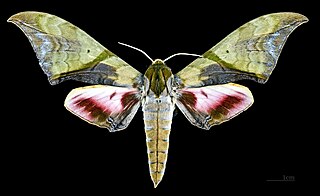
Callambulyx rubricosa, the large pink-and-green hawkmoth, is a species of moth of the family Sphingidae first described by Francis Walker in 1856.
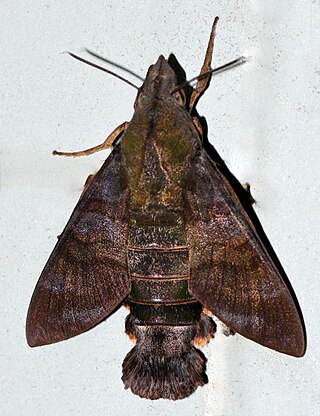
Macroglossum corythus is a species of hawk moth of the family Sphingidae. It was described by Francis Walker in 1856 and is found throughout the Indo-Australian tropics east to New Caledonia.
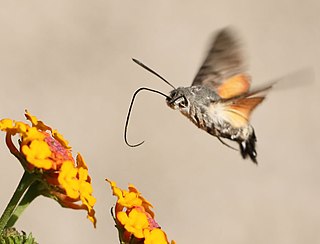
Macroglossini is a tribe of moths of the family Sphingidae described by Thaddeus William Harris in 1839.

Microsphinx is a genus of moths in the family Sphingidae, consisting of one species, Microsphinx pumilum, which is known from South Africa.

Sphingonaepiopsis is a genus of moths in the family Sphingidae.

Pergesa is a monotypic moth genus in the family Sphingidae first described by Francis Walker in 1856. Its only species, Pergesa acteus, the green pergesa hawkmoth, was described by Pieter Cramer in 1779.

Sphingonaepiopsis gorgoniades, the Gorgon hawkmoth, is a moth of the family Sphingidae. The species was first described by Jacob Hübner in 1819. It is found from Croatia, Albania, Macedonia, central and southern Greece, eastern Bulgaria and Romania across southern Ukraine and the Crimea, southern Russia as far north as Kazan, the southern Urals and eastern Kazakhstan to Kyrgyzstan and Afghanistan. It has also been recorded from central and southern Turkey, Lebanon, Israel and western Jordan eastward across northern Iraq, the Caucasus, northern Iran to southern Turkmenistan.
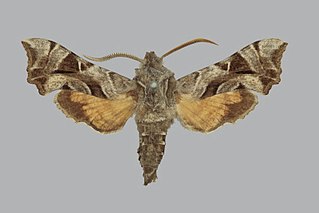
Sphingonaepiopsis kuldjaensis, the Kuldja hawkmoth, is a moth of the family Sphingidae. The species was first described by Ludwig Carl Friedrich Graeser in 1892. It is found in eastern Kazakhstan, western Xinjiang province in China, eastern Uzbekistan, Tajikistan, Kyrgyzstan and eastern Afghanistan.

Sphingonaepiopsis pumilio, the tiny hawkmoth, is a species of moth of the family Sphingidae. It is found from Uttar Pradesh in India, east through Nepal, Bangladesh and Myanmar to China, south to Peninsular Malaysia through Vietnam and Thailand.

Acosmeryx sericeus is a moth of the family Sphingidae. It was described by Francis Walker in 1856.
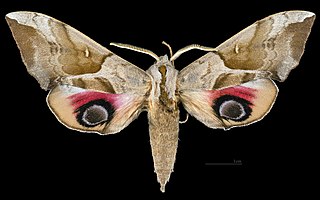
Smerinthus planus, the Oriental eyed hawkmoth, is a moth of the family Sphingidae. It was described by Francis Walker in 1856. It is found from northern Xinjiang across northern China, Mongolia and south-eastern Siberia to the Russian Far East and Japan, and then south through Korea and Taiwan to Hainan, Yunnan and eastern Tibet.
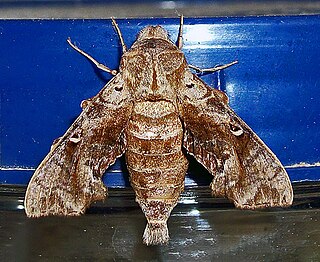
Neogurelca hyas, the even-banded hawkmoth, is a moth of the family Sphingidae first described by Francis Walker in 1856.

Hemaris saundersii, or Saunders' bee hawkmoth, is a moth of the family Sphingidae. The species was first described by Francis Walker in 1856. It is found from southern Kashmir, northern Pakistan, northern India and north-eastern Afghanistan, eastwards along the Himalayan foothills of India to Bangladesh and northern Myanmar. The habitat consists of scrub-jungle at 1,800 to 3,000 metres altitude.
Sphingonaepiopsis gurkoi, the Gurkoi hawkmoth, is a moth of the family Sphingidae. The species was first described by Tomáš Melichar and Michal Řezáč in 2013. It is found in Tajikistan where it has been recorded at elevations above 3,500 meters in mountain steppe areas. It is possibly also found in Mongolia.
Sphingonaepiopsis asiatica, the Kopet hawkmoth, is a moth of the family Sphingidae. The species was first described by Tomáš Melichar and Michal Řezáč in 2013. It is found in the Kopet-Dagh Mountains, along the border of northern Iran and southern Turkmenistan.

















